"The role of a writer is not to say what we all can say, but what we are unable to say." Anaïs Nin
Don't wanna be here? Send us removal request.
Quote
If you are a dreamer come in If you are a dreamer a wisher a liar A hoper a pray-er a magic-bean-buyer If youre a pretender com sit by my fire For we have some flax golden tales to spin Come in! Come in!
Shel Silverstein
0 notes
Text
Preface
While I cannot claim to have mastered the art, and while I don’t think it possible to do so, I am well learned in the teachings of many who have managed to get as close as humanly possible to divine status. I seek not to emulate in style or tone, but in the force that drives the author. As Charles Bukowski wrote, “if you are trying to write like somebody else/forget about it.” As you will come to see, my writing style is unpolished and imperfect. If you criticize every word in every piece, but can recognize forceful pulsing behind each sentence, I will be satisfied.
In the grand scheme of things, in terms of the history of the world and all its contents, writing has not been around for that long. Even writing’s most primitive roots, most often considered to be the cave paintings of tens of thousands of years ago, are recent developments in the universe. Even in terms of human existence, which began around two million years ago, writing is an incredibly recent development. Writing is a modern vessel, a new technology for our species. Like humans, writing has evolved an incredible amount, but within both there is and has always been the theme of communication. Humans are social creatures, as so many like to say, but presence alone rarely satisfies the human. Communication, understanding, a true feeling that not only are you not alone in the world, you are not alone in the confines of your own mind. So while in many literal ways, writing as a dictionary might define it is new, writing as the tool to convey our joys and sorrows, our love and anger, our personal stories and shared history, it is possibly the oldest concept out there.
I try to keep this in mind as a write, remembering the sacred, fragile nature of the monumental power writing gives. There are few pursuits nobler than writing, among it only true music, art, and performance. I feel that in order to truly control the wild flow of composition, a comprehensive appreciation of writing, all it is, all it ever was, all it can ever be, is vital.
0 notes
Text
The Nutcracker

Every year, around this time, my mom used to dress me up in patent leather shoes, struggle to get me into dark stockings, shove me into a red and green plaid skirt, force a frilly blouse over my head, and slap a bow in my hair. I have no idea how long the tradition had gone on, and I couldn’t tell you when it started. All I know is that after my mom’s epic battle to dress me, I would be shuffled into the Black Bear, our name for my uncle’s massive black car, with my three cousins, my uncle, my aunt, and my mom. We would embark on a journey that took, in my impatient, childish mind, long, drawn out days. Days of rowdy cousins, days without sleep, days without food or drink. I learned, later, that it actually only takes an hour to get from here to New York. When we arrived in the city, the sky was darkening, and there was a chill in the air. Only upon arrival would I finally be thankful for my mom’s insisting that I be swaddled in a thick coat and scarf with clumsy winter gloves. We would park wherever we could, often driving for half an hour before realizing that we would never find a spot on Christmas Eve. We would emerge, disgruntled and already tired, from a parking garage, and make the trek to Lincoln Center from wherever we landed. We would be thrown about in the bustle of excited men and women in heavy winter coats, terrified that we might get separated from the parents in the city. Practically clinging to the back of their coats, we made our way through the crowds, and finally breathed the heavy air of the theater. We were always late, and the lights were always dimming as we walked in. A guide would shine a flashlight to our seats, and we would sink into the chairs under the resentful glare of the people in the seats behind us. We begged our parents for the candy in the boxes floating back and forth around the theater, but to no avail. The heavy velvet curtains sauntered open to reveal a simple hallway lit with candles. A woman in a nightgown crossed the stage, blowing out the candles, as an orchestra weaved a foreboding melody. The Nutcracker, a true Christmas classic, had begun. It was a festival of colors and music and ballet, and it was nice, but I knew it all by heart. I could tell you every single thing every single actor would do from the curtain’s open to its close. So whenever I heard we were going to see The Nutcracker again, I complained. I felt we could at least go to a different show, if she wanted to drag me out to the city for hours on Christmas Eve. I would also complain about decorating the tree, which I felt was a tedious and pointless task. I complained about stringing lights on the trees in our front yard, and I complained about going over to my aunt’s house, dressed up, for Christmas dinner. These traditions, I felt, had gone on long enough, and were no longer necessary. Like making your bed or cleaning your room, there is so much monotony in even annual traditions that I stubbornly insisted there must be a way to make the holiday season more memorable. This year, though, we didn’t decorate the tree; we didn’t string lights on the trees, and we haven’t even bothered bringing out the boxes of Christmas ornaments. And we’re not going to see the Nutcracker. We actually haven’t seen it in a while, and though I still remember it in stunning detail, time has worn away my resentment of the production, and I almost miss it. Just like the lead singer of the now very obscure band CINDERELLA says, “You don’t know what you got till it’s gone.” It doesn’t really feel like Christmas is just four days away. If it weren’t for the snow littering the ground, I probably wouldn’t even realize it was winter. I miss my family’s traditions now, because as annoying as they were, they reminded me that the holidays were really here.
0 notes
Quote
Do not go gentle into that good night, Old age should burn and rave at close of day; Rage, rage against the dying of the light. Though wise men at their end know dark is right, Because their words had forked no lightning they Do not go gentle into that good night. Good men, the last wave by, crying how bright Their frail deeds might have danced in a green bay, Rage, rage against the dying of the light. Wild men who caught and sang the sun in flight, And learn, too late, they grieved it on its way, Do not go gentle into that good night. Grave men, near death, who see with blinding sight Blind eyes could blaze like meteors and be gay, Rage, rage against the dying of the light. And you, my father, there on the sad height, Curse, bless, me now with your fierce tears, I pray. Do not go gentle into that good night. Rage, rage against the dying of the light.
Dylan Thomas
0 notes
Text
A Thousand Words
“A picture is worth a thousand words.” A thousand, in case your capacity for numerical reasoning is severely hindered, is a lot. Rarely, if ever, do we find ourselves dealing with a thousand single units of anything. We simplify our currency in to larger and larger values to avoid the hassle of lugging around and counting a thousand pennies weighing over five pounds total, opting instead for a thin piece of paper weighing in at about one gram. The average human head is said to have about one hundred thousand hairs on it, but I doubt any one of us has tried and succeeded in counting up to even one thousand of those hairs. Picture your parents in high school all of those hundreds of years ago, when “computers” were humans who did mathematical calculations, counting individual words when their teachers assigned thousand word essays. Even now, as I continually hit CONTROL, SHIFT, C to bring up a word count, I know that a thousand is not a small sum; we are just now approaching two hundred words. I checked, and most of my Writer’s Notebooks are about five hundred words long. So, yes, one thousand words is a lot. But is one thousand words enough to equate an entire picture? All of the possible descriptive adjectives in combination with all of the thoughts and memories and feelings that one picture alone can evoke must be more than one thousand words. Are the eight hundred words I have left enough to describe my last thoughts on the complexity of the relationship between our vision and out linguistic cognition?
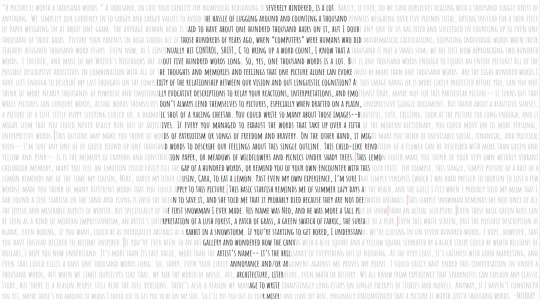
As this image hangs or is more likely projected before you, can you not think of more nearly thousands of powerful and emotionally evocative descriptions to relay your reactions, interpretations, and emotions? Okay, maybe not for this particular picture-- it turns out that while pictures can conjure words, actual words themselves don’t always lend themselves to pictures, especially when drafted on a plain, inexpressive Google document. But think about a beautiful sunset, a picture of a cute little puppy sleeping curled up, a dramatic shot of a racing cheetah. You could write so many about those images--beautiful, cute, exciting. Look at the picture for long enough, and it might seem that you could never really run out of adjectives. If every you managed to exhaust the words that take up over a fifth of the modern dictionary, you could move on to more personal, interpretive words.
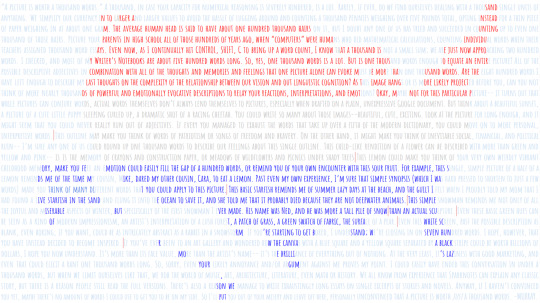
This outline may make you think of words of patriotism or songs of freedom and bravery. On the other hand, it might make you think of inevitable social, financial, and political ruin-- I’m sure any one of us could round up one thousand words to describe our feelings about this single outline.
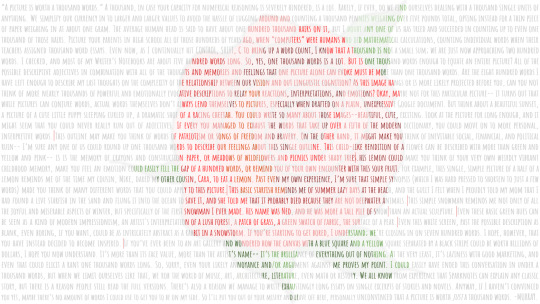
This child-like rendition of a flower can be described with more than green and yellow and pink-- is is the memory of crayons and construction paper, or meadows of wildflowers and picnics under shady trees.
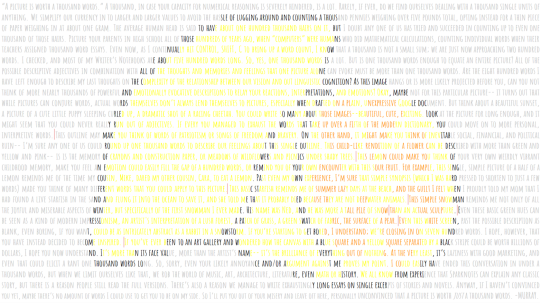
This lemon could make you think of your very own weirdly vibrant childhood memory, make you feel an emotion could easily fill the gap of a hundred words, or remind you of your own encounter with this sour fruit. For example, this single, simple picture of a half of a lemon reminds me of the time my cousin, Mike, dared my other cousin, Cara, to eat a lemon. Past even my own experience, I’m sure that simple synopsis (which I was hard pressed to shorten to just a few words) made you think of many different words that you could apply to this picture.
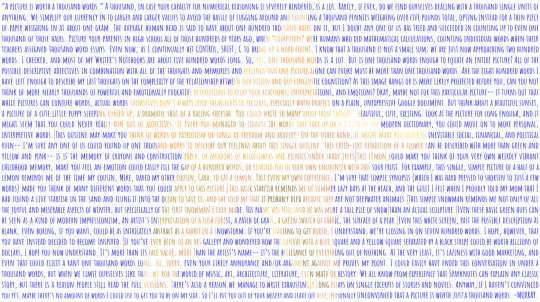
This basic starfish reminds me of summer lazy days at the beach, and the guilt I felt when I proudly told my mom that I had found a live starfish in the sand and flung it into the ocean to save it, and she told me that it probably died because they are not deepwater animals.

This simple snowman reminds me not only of all the joyful and miserable aspects of winter, but specifically of the first snowman I ever made.
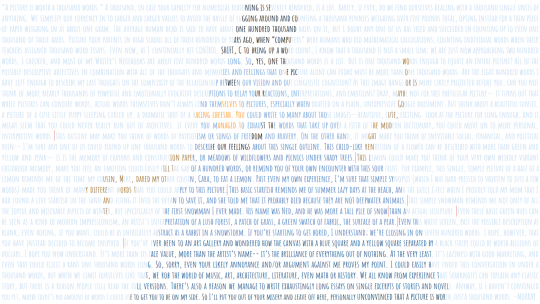
His name was Ned, and he was more a tall pile of snow than an actual sculpture.
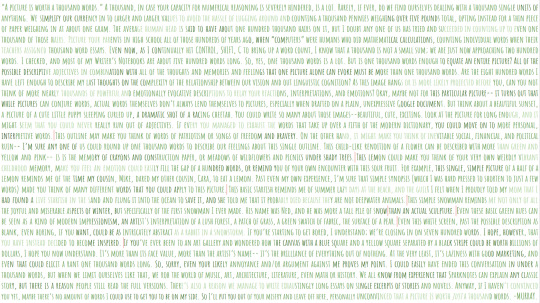
Even these basic green hues can be seen as a kind of modern impressionism, an artist's interpretation of a lush forest, a patch of grass, a green swatch of fabric, the surface of a pear.

Even this white screen, past the possible description as blank, even boring, if you want, could be as intricately abstract as a rabbit in a snowstorm. If you’re starting to get bored, I understand; we’re closing in on seven hundred words. I hope, however, that you have instead decided to become inspired.
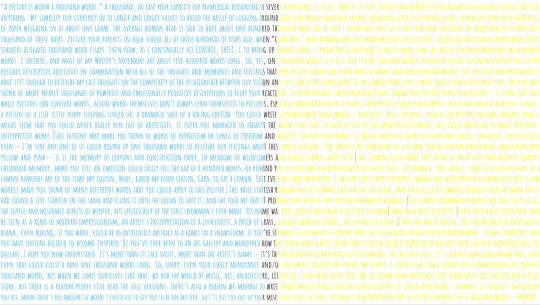
If you’ve ever been to an art gallery and wondered how the canvas with a blue square and a yellow square separated by a black stripe could be worth billions of dollars, I hope you now understand. It’s more than its face value, more than the artist’s name-- it’s the brilliance of everything out of nothing. At the very least, it’s laziness with good marketing, and even that could elicit a rant one thousand words long. So, sorry, even your likely annoyance and/or argument against me proves my point. I could easily have ended this conversation in under a thousand words, but when we limit ourselves like that, we rob the world of music, art, architecture, literature, even math or history. We all know from experience that Sparknotes can explain any classic story, but there is a reason people still read the full versions. There’s also a reason we manage to write exhaustingly long essays on single excerpts of stories and novels. Anyway, if I haven’t convinced you yet, maybe there’s no amount of words I could use to get you to be on my side. So I’ll put you out of your misery and leave off here, personally unconvinced that a picture is worth just a thousand words.

0 notes
Quote
If you can keep your head when all about you Are losing theirs and blaming it on you, If you can trust yourself when all men doubt you, But make allowance for their doubting too; If you can wait and not be tired by waiting, Or being lied about, don’t deal in lies, Or being hated, don’t give way to hating, And yet don’t look too good, nor talk too wise: If you can dream—and not make dreams your master; If you can think—and not make thoughts your aim; If you can meet with Triumph and Disaster And treat those two impostors just the same; If you can bear to hear the truth you’ve spoken Twisted by knaves to make a trap for fools, Or watch the things you gave your life to, broken, And stoop and build ’em up with worn-out tools: If you can make one heap of all your winnings And risk it on one turn of pitch-and-toss, And lose, and start again at your beginnings And never breathe a word about your loss; If you can force your heart and nerve and sinew To serve your turn long after they are gone, And so hold on when there is nothing in you Except the Will which says to them: ‘Hold on!’ If you can talk with crowds and keep your virtue, Or walk with Kings—nor lose the common touch, If neither foes nor loving friends can hurt you, If all men count with you, but none too much; If you can fill the unforgiving minute With sixty seconds’ worth of distance run, Yours is the Earth and everything that’s in it, And—which is more—you’ll be a Man, my son!
Rudyard Kipling
0 notes
Text
What Color are Mirrors?

There are two long mirrors hanging in my dining room. The handyman who hung them wasn’t as concerned with aesthetic appeal as my mother is, and let the nail and wire show above the mirrors. My mom carefully wrapped and tied light, almost creamy pink bows over the wire and nail to rectify the problem. One of the mirrors has a low, rustic white table with a lamp in front of it, and for that reason (and the fact that I have no full-body mirror in my room), I spent most of my vanity hours in front of the mirror closest to the back porch. It was hung on a part of the wall that jutted out to fit a small closet within the painted plaster, and to the right my mom had hung China plates of varying sizes. As I got older, and tall enough that I was a hazard, she would warn me not to brush against the wall, because the plates were loosely hung. But before, when I was too short to reach the plates jumping, and when even the dining room table was high enough to walk under, barely crouching, I ran through the house freely, cautioned to avoid nothing except the corners of walls and tables that could only hurt me. Usually I played by myself, as only children learn early to do. I didn’t have many playdates, not just because the house was generally too small to accommodate any more than one extremely hyper first-grader, but because my mom was a single working mother. I never minded, I was free to go over to my friends houses instead, or spend the afternoon at my cousin’s house, and I was as happy reading as running. But one day my mother must have taken off work, because my best friend of the time came over. She had pale skin and freckles, and dark brown hair that was almost always in a braid. I remember running after the tail of that brown braid as it disappeared behind a corner. As I rounded the corner, I found myself face to face with my reflection. I don’t know what I was expecting, or whether I was really expecting any particular face to greet me. All I know is that I stared into eyes I knew had to be mine, but in a momentary fit of prosopagnosia, I didn’t recognize myself. Race, which I had always been blind to. Race, a word that had not before existed. Race, the thing that separated me from everyone I knew. I had been colorblind, and made by some miracle or fate to see the world as it was. When I later tried to explain the sensation to my mom, I told her, “I don’t really see myself as white, and I don’t want to be white, but I didn’t realize I wasn’t.” I didn’t realize that there was anything to separate me and my best friend, other than that she was her, and I was me. Though it did startle me for a time, I didn’t dwell much on it; first graders have no capacity to dwell. I never forgot the encounter, though, and throughout my life it has become a more and more present memory, replaying like a home-video in my mind. More and more, my ethnicity has crept into my identity, and I realize how much I had been ignoring it. I had discarded it like an old stuffed animal or old blanket stuffed in the back of a closet, happened upon only when searching for something else. Usually, I wasn’t even aware it was there. When I pictured myself, I was a blank canvas of no race, no distinguishing features or colors or shapes to indicate any particular heritage, a picture I needed so rarely it often became blurred around the edges, tarnishing like silver from disuse. As I got older, I began to develop a more accurate picture of myself. This development was forced not only as part of my growing inclination to admire my reflection as a teenage girl, but my growing awareness about the world. I had never been terribly concerned with stereotypes; in fact I was often embarrassingly naïve to them. My innocence slipped away as the years wore on, and suddenly, as one begins to recognize adult jokes they were previously oblivious to as children, I found myself uncomfortable at the ways others occasionally talked or acted. Before, my first inclination to stranger’s odd behavior around me was to wonder if there was something wrong with them, but now, often, my first thought is to wonder whether it is not just their problem, but their problem with me. Each time something suggestive happened, I was struck with a clearer view of my own face. I would remember, “Oh, yeah… that’s what I look like– that’s how they see me.” This was never accompanied by shame or any desire to be anything else, but an awkward sensation of confusion and lack of identity, or a ill-fitting identity like a starchy dress worn only on special occasions. For a while now, though I’m not entirely certain how long, that itchy dress has become a part of me, softening against my skin and molding to my being, or maybe I to it. I had to do a lot of stretching to get the outfit to fit, though, and trying to incorporate my race into my life often led to many unnatural and overstated expressions and acknowledgements of race. It made others even more uncomfortable than it made me, I found, but I that finding myself was worth the cost of their blushes. And the payoff, I think, meant little to anyone else, and has changed little in my life, but in my mind, everything seems different. Along with seeing my own race, I saw others. Like emerging from the world of Scout Finch, I lost my colorblindness. Colorblindness gave me a safe haven for a while, but I’ve found that the world is much more interesting in different hues.
0 notes
Quote
S’io credesse che mia risposta fosse A persona che mai tornasse al mondo, Questa fiamma staria senza piu scosse. Ma percioche giammai di questo fondo Non torno vivo alcun, s’i’odo il vero, Senza tema d’infamia ti rispondo. Let us go then, you and I, When the evening is spread out against the sky Like a patient etherized upon a table; Let us go, through certain half-deserted streets, The muttering retreats Of restless nights in one-night cheap hotels And sawdust restaurants with oyster-shells: Streets that follow like a tedious argument Of insidious intent To lead you to an overwhelming question … Oh, do not ask, “What is it?” Let us go and make our visit.
J. Alfred Prufrock
0 notes
Text
Thoughts on “Gadsby”
Before you officially start reading, I just want to make it known that I will not be using the letter “E” during this Writer’s Notebook. Feel free to follow along and check me, and hopefully the reason for my omission of the letter will be made evident within the Writer’s Notebook, but I can sum my motivation up now in two words: for spite.

Gadsby. No, not Gatsby, not that book our class just had hours of discussion on. Gadsby, G-A-D-S-B-Y, a book by a man who I will call “Wright”, his family’s autonym. I find Wright fascinating for his unusual scorn of a symbol in our vocabulary’s most basic building blocks, which I brought up at a point past. Thus, in his honor, I am drafting this work totally without this particular symbol, which may justify my odd words and grammar. It is also why this work is kind of short. Anyway, Wright’s book is, in almost all ways, a totally normal book. It’s focus is not on this fact that it will not apply this symbol of abomination, although its introduction, which, should you pick this book to flip through, will discuss this affair with much duration. My fascination with Wright and his book, Gadsby, grows from my own disposition, which favors annoying actions that occur just to annoy. Much of my own animation occurs for this most basic ambition, which is to irk folks, pardon my hillbilly-akin form as I try to avoid a particular symbol. I snack on Kit Kats by biting into unsplit bars, which, as many of my companions can confirm, is a kind of mildly infuriating that annoys to no limit, much as song that follows roughly: I know a song that lands on all human’s whitish fibril cords that transmit stimuli to and from your brain and spinal cords. (As a slight discursion I wish to clarify that I would only do this in public, and to annoy; I would not dishonor my morals so much as to actually champion consumption of Kit Kats in this fashion.) Similarly, I only commit my physical stamina in running, which I do daily, if I am undoubtful that I will bug my companion by winning against said companion in a run, if only by an instant, who has a autograph I cannot commit unto this work. My triumphs, and thus many of my failings, occur as offshoots of my ambition to disturb. I know it is not a distinguishing factor to boast, but it is a basis of so much of my animation, I thought it might hurt and not aid voicing such a vital part of yours truly. I will in a forthcoming day, possibly try to right this childish wrong, but for now, I will allow my immaturity to spawn dictums about my actions. Rivalry is a commanding authority that it can allow anybody to act against his usual will, and is not far from basic mortal sin of grass’s color. I am sorry if this was a confusing composition to follow; just know it was arduous to draft, although it is a sound way to strong-arm anybody into finding a ridiculous amount of synonyms for common words.
0 notes



